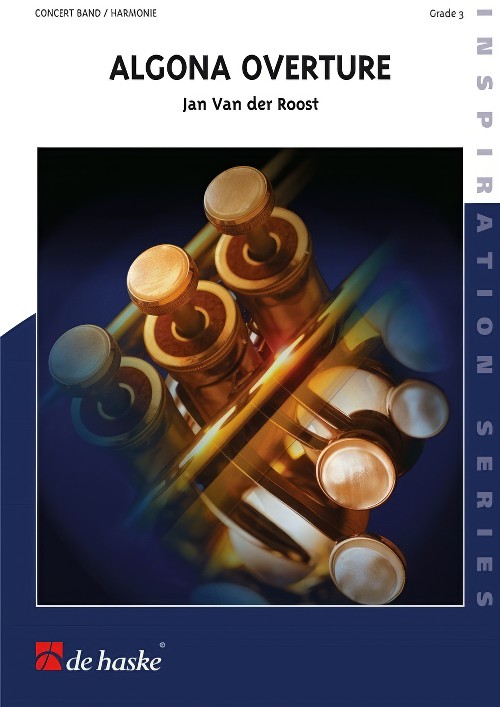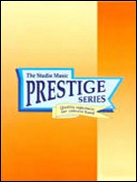Results
-
 £154.99
£154.99Algona Overture (Concert Band - Score and Parts) - Van der Roost, Jan
This piece is dedicated to all the citizens who live, have lived, and will live in the US town of Algona, who commissioned the work to celebrate it's 150th anniversary. With dark-tinted tones (low drums, heavy brass), this overture begins with a primitive sacred feel, it seems as if centuries-old Indian singing is heard once more. Gradually the sound becomes clearer and brighter as the same theme travels throughout the band in various guises and variants. Imposing tutti passages then give the band the chance to lavishly shine. This bright and catchy overture radiates spontaneous energy and as it features every section of the band all the players as well as the listeners are continually surprised and captivated.Duration: 9:00
Estimated dispatch 7-14 working days
-
 £79.99
£79.99Simple Sarabande (Concert Band - Score and Parts) - Sparke, Philip
The sarabande originated in the early 17th century and is a stately dance in triple time. It was popular in France and Spain but as a dance it quickly spread throughout the courts of Europe and the style was soon adopted into instrumental music in dance suites for solo instruments as well as orchestra. Something of this style has influenced Simple Sarabande and although its harmonic language is perhaps more up-to-date, it could be seen as a period piece.Duration: 2:15
Estimated dispatch 7-14 working days
-
 £209.95
£209.95Clarinet Concerto (Ellerby) (Prestige Concert Band - Score and Parts) - Ellerby, Martin
The opening 'Carousel' takes a leaf out of the American minimalist composers' book and is energetic and resourceful throughout, conjuring up images of a fairground ride that is not too much of an intrepid adventure! The central 'Cameo' presents and re-presents a delicate, highly legato, melisma for the soloist. A somewhat brooding central episode provides both a moment of contrast and the opportunity for the soloist to deliver some free cadenza-type material before returning to the security of the opening calm. The closing 'Charabanc' is a freely developed rondo-style finale embracing influences from jazz and other light music forms. Listeners are encouraged to use their own imagination, as it is intended to be whatever you want it to be!Performance time 15'15"This work was commissioned by and is dedicated to Linda Merrick and is featured on the recording QPRM137D LINDA MERRICK, Linda Merrick and the RNCM Wind Orchestra
Estimated dispatch 7-14 working days
-
 £44.95
£44.95Clarinet Concerto (Ellerby) (Prestige Concert Band - Score only) - Ellerby, Martin
The opening 'Carousel' takes a leaf out of the American minimalist composers' book and is energetic and resourceful throughout, conjuring up images of a fairground ride that is not too much of an intrepid adventure! The central 'Cameo' presents and re-presents a delicate, highly legato, melisma for the soloist. A somewhat brooding central episode provides both a moment of contrast and the opportunity for the soloist to deliver some free cadenza-type material before returning to the security of the opening calm. The closing 'Charabanc' is a freely developed rondo-style finale embracing influences from jazz and other light music forms. Listeners are encouraged to use their own imagination, as it is intended to be whatever you want it to be!Performance time 15'15"This work was commissioned by and is dedicated to Linda Merrick and is featured on the recording QPRM137D LINDA MERRICK, Linda Merrick and the RNCM Wind Orchestra
Estimated dispatch 7-14 working days
-
 £118.99
£118.99Kaiser-Walzer Wind Band Set (Score & Parts)
Everybody loves a Strauss waltz and they can beguaranteed to put a smile on the face of the audienceduring a concert. This waltz was composed in1888 by Johann Strauss, Jr. and many peopleconsider it to be his best composition - evenrivalling The Blue Danube.The Kaiser-Walzer has a quiet, rather melancholicopening, entirely in character with the personalityof the calm and dignified monarch Franz-Josef towhom it was dedicated. It is full of playful motifsand refined surprises and the lilting melody is sureto make everyone want to get up and dance. 0:13:20
Estimated dispatch 7-14 working days
-
 £137.99
£137.99Odyssee Wind Band Set (Score & Parts)
The Odyssee tells the story of Odysseus, the undaunted hero. In times long ago the blind poet Homer wrote this famous epic. The "Odyssey" follows the "Iliad", the story of the bloody war between the Greek and the Trojans. This battle ends after ten years thanks to the Odysseys famous trick. the Trojan Horse. The Odyssey is not a war epic, but a story about perseverance, loyalty, adventure, and the survival instinct of its ingenious hero. In The Odyssey, Homer describes how Odysseus, the king of Ithaca, had to endure another ten years of affliction after the ten years of war in Troy before he could finally return to his home land. During those years, his wife, Penelope, had to try and keep her many admirers away. These men not only wanted het hand but also the kingship. To prove her husbands worth, she played a trick: "As soon as I have finished weaving this shroud for my father-in-law, Laertes, I will choose one of you to become my husband", she promised them. But during the night, she secretly loosened what she had woven during the day, prolonging the time until Odysseus would finally return. After twenty long years, when he finally stood at the door, she wondered: Is this really my husband? Is he an imposter? Cunningly, she asked him to move the bed, because only she and her husband know that the bed was immovable and was build around an old three trunk! Odysseus was deeply moved: this really was his wife, his Penelope! Nearly three thousands years later, the loyalty and strength of this character, and all the dangerous adventures that Odysseus survived thanks to courage and intelligence, still moves us today. Odyssee by Jan Bosveld is not just an adventure story, but rather a characteristic piece in which memories of Homers story can be heard. The composition opens with a firm, stirring theme describing our hero, Odysseus, in detail: This man is not to be taken lightly. The further development of this short introduction completes this character sketch: trustworthy, perseverant, and a genius. After that we can picture Odysseus on the lonely beach of Ogygia. Do the trumpets depict his memories of the war of Troy? Does he think of his wife, as we recognise the weaving loom of Penelope in the murmuring eighth? In the solemn, plaintive part that follows, we can imagine Penelope feeling lonely, sitting in the womens room with her servants.One of the girls plays the harp, but that does not clear the sombre atmosphere. Then we can imagine seeing the sorceress Circe, who changed Odysseus men into swine. After she gives a simple magic sign something follows that reminds us of the sound of pigs grunting. Then the Odysseus theme resounds: the hero comes to savi his comrades. Assisted by Hermes, he forces Circe to lift the spell. The piece ends the same way as it began, with an animated theme: Odysseus is still the same, undefeated and not to be taken lighty! 07:45
Estimated dispatch 7-14 working days
-
 £72.99
£72.99Italian Wedding Song
Italian Wedding Song is a lyrical, very romantic song in G minor, reminiscent in some ways of the music of Puccini and Verdi. Like Barnes' Yorkshire Ballad, it is a brief, solemn work, perfect for teaching students to play in an emotional, legato style. If you have a good Euphonium player, this work is a must; it is an excellent choice for a moment of touching repose on your next concert. Italian Wedding Song is carefully scored and cross-cued, and the ranges are very reasonable for all instruments.
Estimated dispatch 7-14 working days
-
 £122.50
£122.50Suite - Istvan Bogar
Istvn Bogr's series of movements intended for youngsters is colourfully instrumented, evocative music, rich in melodic invention; in character it is most closely akin to Tchaikovsky's Nutcracker ballet music. In the opening movement (Little march), little boys wearing paper shakos on their heads and carrying wooden swords play at soldiers. The following movement, Humming, is the only movement in the suite that is calm and in odd-numbered rhythm; in it the children gather flowers in their little baskets, and meanwhile hum pleasant tunes. The third movement is a funny game, with its tempo sometimes speeding up, sometimes slowing down, but by the end really going wild.The title of the finale is Game of tag. The tiny formal sections and interludes in this lively, cheerful music are linked together by a recurring rondo theme, and the chase ends with a brief coda.
Estimated dispatch 7-14 working days
-
£134.30
Wellingtons Sieg - Ludwig van Beethoven
After the 'Battle of Vitoria', Beethoven's friend Johann Nepomuk Maelzel talked him into writing a composition for his panharmonicon (a kind of 'mechanical orchestra') to commemorating this battle. The piece, 'Wellingtons Sieg' ('Wellington's Victory') was dedicated to the Prince Regent, later King George IV and first performed in Vienna on 8 December 1813 at a concert to benefit Austrian and Bavarian soldiers wounded at the 'Battle of Hanau', with Beethoven conducting. It was an immediate crowd-pleaser and met with much enthusiasm from early concertgoers and the piece proved to be a substantial money-maker for Beethoven. 'Wellingtons Sieg' is something of a musical novelty. Besides the orchestra, on stage there are two 'sides', British and French, both playing the same instruments: Trumpets, Snare Drums, 'Canon' and Ratchet. The work has two parts: the 'Battle' ('Schlacht') and the 'Victory Symphony' (Sieges Sinfonie). The first part is programme music describing two approaching opposing armies and contains extended passages depicting scenes of battle. It uses 'Rule Britannia' for the British side and 'Marlbrough s'en va-t-en guerre' for the French side. The 'Victory Symphony' exhibits some typical Beethoven composing techniques. It can be considered as a sonata form that, stripped of the development section, comes equipped with an extended coda. Dutch arranger Andreas van Zoelen transcribed 'Wellingtons Sieg' for Symphonic Band.
Estimated dispatch 7-14 working days
-
 £42.50
£42.50Encore! - Goto Yo
Encore! was commissioned by Ishikawa Prefecture Band Association to celebrate its 50th anniversary in 2010. The commissioning request was that the piece be fun and appropriate as an encore. I made it simple and enjoyable for everyone.The only thing I added was an appealing introduction so each entering section might feel the importance of their instrument. That's why there is a specified appearance order involving standing. It goes from 1) clarinets, 2) piccolo, flute, horn, oboe and bassoon, 3) percussion, 4) euphonium, tuba and double bass, 5) trombone, 6) saxophone to 7) trumpet. Lastly, all sections stand up together and greet the audience. Technically, it's a medium grade level. There are substitutions for bands lacking oboe, bassoon or double bass.The title was selecting hoping for a fun, grand finale. It also means "more" and "again." My hope is for performers and audience to enjoy music, and for Ishikawa Prefecture Band Association to nourish its band movements and activities. I could not ask for more if people come to love music even more by experiencing this work.(Yo Goto)
Estimated dispatch 7-14 working days
